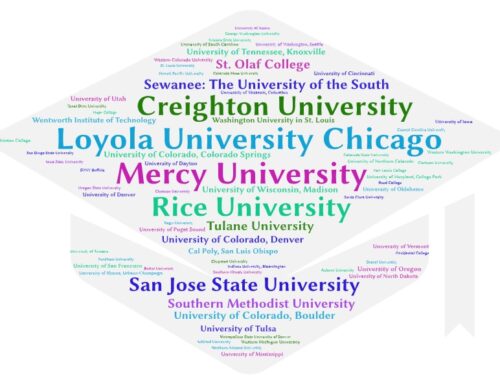One of the most challenging aspects of the COVID-19 pandemic is the amount of uncertainty surrounding it, and for high school seniors, one of the greatest areas of uncertainty is what college will look like this fall. Although many colleges have announced that they intend to re-open their campuses in August or September, at this point, it’s too soon to know what’s really going to happen. A recent NPR story outlined six possible scenarios for colleges this fall, and an Inside Higher Ed article went even further by describing 15 possible options.
For those who have long dreamed of the “college experience,” which involves much more than taking classes, the idea of starting college online is anything but appealing. In late March, a survey of college-bound high school seniors found that 20% are likely or highly likely not to start college this fall due to coronavirus.
Amidst all this uncertainty, a gap year might seem like a good alternative. As explained in a previous blog post, there are several considerations for students who are thinking about a gap year, but now, there are even more questions to ask if you are pondering this possibility. While there are many benefits of taking a gap year under normal circumstances, this year may not be the right time to take one, as detailed below.
Does your college of choice allow deferrals? Although many schools are open to and accommodating of students who want to take a gap year, that isn’t true for all institutions. Furthermore, because colleges are struggling financially due to COVID-19, some may enact more strict deferral policies than they have had in the past, as they need this fall’s tuition revenue more than ever. A colleague told me one of her students was informed by a large public university that it would not be allowing any deferrals due to COVID-19. The small liberal arts college that one of my students is planning to attend is going to let students request a deferral but won’t necessarily grant all requests. If your chosen college doesn’t allow deferrals or doesn’t approve your request for one and you still want to wait and start next fall, you’ll have to reapply. Before you begin exploring options for a gap year, contact the college in which you intend to enroll to ask about its policy.
Will a deferral impact your financial aid? While some colleges will carry over merit scholarships to the following year if a student defers, you will have to reapply for need-based aid, just as current college students have to reapply every year. Again, you should check with the college you plan to attend.
Can you take college courses elsewhere? Some students are thinking of taking courses at a local community college rather than going far away or facing the prospect of online classes. This idea also appeals to many parents as well, who are balking at the idea of paying private school tuition for a virtual education. However, if you earn college credits at another institution, you may have to reapply to your selected school as a transfer student. This could also affect your chances to get financial aid, as colleges often have more aid (both merit- and need-based) available for freshmen than for transfer students. As with the previous two points, it’s important that you check directly with your college of choice about its policy.
Will you be able to participate in an organized gap year program? If colleges are unable to reopen for on-campus learning and living this fall, it stands to reason that many gap year programs also will be canceled. It seems highly unlikely that programs that involve traveling abroad will proceed as planned, and even domestic programs could be canceled if social distancing directives are still in place. Some gap year organizations are exploring offering online programs, but would that really be any more enjoyable or beneficial than taking online college courses? Other options may be limited as well: whereas, in previous years, gap year students could volunteer, do an internship, or get a job, these opportunities are also likely to be impacted by COVID-19.
Since high schools shifted to online instruction, several of my students have expressed that they are bored. Their schoolwork isn’t taking much time, and with the absence of sports and activities and the inability to see their friends, they have little to do. If you don’t start college in the fall and you don’t have anything else to do, that boredom will only continue.
If you’re seriously thinking about a gap year, in addition to inquiring about the policy at your chosen college, be sure to identify your reasons for deferring. Your gap year experience is likely to be much more meaningful if you can clearly articulate why you’re taking one. The Gap Year Association’s Planning Guide is a good starting place for figuring out the why and what of your gap year plans.






